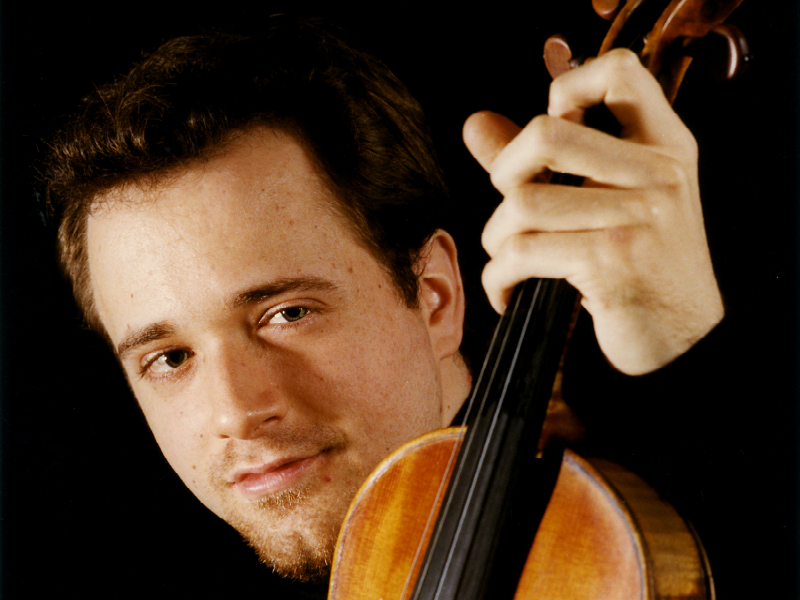In 2015, Ittai Shapira, an Israeli-American violinist and composer, was asked to perform music created by the Jewish composers who had perished at Theresienstadt. The concert was to mark the 70th anniversary of the liberation of the infamous concentration camp.
In a telephone interview, Shapira said that after immersing himself in the music, he was so moved by Hans Krása’s Brundibár, a children’s opera that was performed at the camp, that he composed his own music for the anniversary event. “Brundibár changed me,” he said. “I began to wonder about the children – who had lived and who had died.”
His work, The Ethics, debuted at Carnegie Hall in 2015. Now Shapira will be performing the work in three Canadian cities – Toronto, Ottawa and Montreal. He will be accompanied by pianist Constanze Beckmann and McGill University’s Schulich Singers, led by Jean-Sébastien Vallée.

The concerts are dedicated to the memory of George Brady, a survivor of Theresienstadt whose story and that of his sister, Hana, was told in the book, Hana’s Suitcase. Brady died in Toronto earlier this year. His daughter, Lara Brady, will be speaking at the concerts.
The first performance will take place in Toronto on Nov. 4, which coincides with Holocaust Education Week in the city.
In Ottawa, the concert will be held at 7:00 p.m on Nov. 10 at Dominion-Chalmers United Church. The final concert takes place in Montreal on Nov. 12 at 7:30 p.m. at the Pollack Concert Hall.
The performances have been curated by Beckmann, a young German Jewish pianist who studied music in Toronto. While she currently resides in New York, she visits Toronto regularly. In fact, she still maintains her membership at Beth Torah Congregation.
Beckmann, 31, has been organizing musical programs for Holocaust Education Week for the last eight years. She explained that she was encouraged to do so by the late Felicia Carmelly, a Holocaust survivor.
Since 2011, Beckmann has worked closely with the German consulate, the sponsor of many musical Holocaust education programs.
This year, the German ambassador to Canada, Sabine Sparwasser, approached Beckmann about organizing a concert in memory of her friend, Brady.

Brady said her father was one of the 100 boys who passed through Room 1 in Theresienstadt. The group published a newspaper called Vedem and Shapira has incorporated some poems from it into his music.
“My father would have loved that some of the Vedem poems were put to music,” she said. “He loved music. He was (a) life-long supporter of the TSO (Toronto Symphony Orchestra).…
“My father would be honoured that his name is still being used to honour the boys of Terezin (Theresienstadt) who did not survive.”
Beckmann said that when she learned about Brady’s history at Theresienstadt, she approached Shapira about performing The Ethics, a work that’s very fitting for a concert held in Brady’s memory.
Shapira said he’s thrilled to have the opportunity. “I am grateful to Constanze for bringing The Ethics to its Canadian premier,” he said.
Shapira said that after studying Brundibár, he was inspired for the first time to write words to his music. The text was written in collaboration with anthropologist Natasha Zaretsky.
This work entailed research, he said. “I was privileged to interview survivors such as Ella Weissberger. I also had access to Eva Sachs’s diary.”
Weissberger had played the part of a cat in Brundibár.
READ: HOLOCAUST EDUCATION WEEK BRINGS THE SHOAH HOME
Shapira explained that in the composition, the violin part is the voice of the narrator asking questions. “The choir represents the children and the ghosts of the children,” he said.
Shapira said The Ethics has led him to partner with Zaretsky on several projects involving music and healing. “I’ve gone on to write a number of compositions on human justice,” he noted.
He has also collaborated on related projects with some prominent people, including author Salman Rushdie and architect Daniel Libeskind.
The Ethics is named after the book of the same name, which was written by 17th-century philosopher Baruch Spinoza. Shapira said his piece begins and ends with a quote from Spinoza: “If you want the present to be different from the past, study the past.”
